AUTHOR OF THE REPORT/PHOTO: MARIAM NIKURADZE, JOURNALIST AND CO-FOUNDER, OC MEDIA
1/ KEY FINDINGS
In Georgia, 139 cases of attacks/threats against professional media workers and editorial offices of both traditional and online publications were identified and analysed in the course of the research for 2023 and January-July of 2024. Data for the study was collected using open-source content analysis in Georgian, English and Russian. A list of the main sources is presented in Annex 1.
- Media freedom in Georgia came under threat in 2023 and 2024 when the government introduced the so-called “Foreign Agents Bill.” The bill was initially withdrawn following mass protests but was reintroduced and adopted in 2024. The law, which came into force on 1 August, threatens the existence of independent media and civil society organisations.
- In 2023-2024, 62% of attacks (86 out of 139 incidents) were committed by government officials.
- Physical attacks and threats to life, liberty, and health remained the primary methods of pressure on media workers during this period.
- In 2024, alongside physical attacks, media workers and activists faced non-physical pressure through hate campaigns. These included vandalising offices, vehicles, and apartments with messages such as “foreign agent” and “traitor.” Journalists and activists also reported receiving anonymous calls threatening their health and lives.
- In the past two years, government officials and their affiliates increasingly used SLAPPs (“strategic lawsuits against public participation”) to pressure media workers. According to the Georgian Democracy Initiative (GDI), which monitors SLAPP cases in Georgia, there are at least 43 cases in the courts, with 39 targeting local media and journalists.
2/ THE POLITICAL SITUATION AND THE MEDIA IN GEORGIA
According to a November 2023 poll by the International Republican Institute, Imedi TV, a pro-government channel, is the most trusted TV channel in Georgia, followed by Rustavi 2, another pro-government channel, with the opposition channel Mtavari TV in third place. While the majority of the population still gets its information from TV, Internet usage is high, particularly among young people, although it remains secondary. Facebook is the most popular social media platform and is often used by the government, pro-government media, Russian disinformation pages, and far-right groups for manipulation, spreading disinformation, and hate speech.
A report published by Meta in August 2024 revealed that some pages linked to Russia, which supported the Georgian government and criticised civil protests against the foreign agents’ law, were taken down: “We removed 76 Facebook accounts, 30 Pages, and 11 Instagram accounts for violating our policy against coordinated inauthentic behaviour. This network originated in Russia and targeted Georgia, Armenia, and Azerbaijan.”
There are about a dozen popular TV channels with broadcasting licences in Georgia, most of which are pro-government. While there is no official registry of online media, over 60 online media outlets signed a statement in 2023, declaring they would not comply with the foreign agents law.
The Georgian Charter of Journalistic Ethics, a self-regulatory organisation with 360 members from various media outlets, held a meeting on August 14, 2024, where members unanimously voted against complying with the foreign agent law. The Charter, which is also targeted by the law, will not be registered in the government database.
In 2024 Freedom House categorised Georgia as “partly free” ranking it 58th among 100 countries. The Freedom in the World report states: “Corruption in the government persists, and media freedom is undermined by intimidation and pressure against journalists. Executive and legislative interference in the courts remains a substantial problem, as does a lack of transparency and professionalism surrounding judicial proceedings.”
The state of media freedom in Georgia has deteriorated alongside a democratic downturn. In 2024, Georgia dropped 26 places in the World Press Freedom Index, ranking 103rd, down from 77th in 2023.
Despite large-scale protests, the ruling Georgian Dream party reintroduced and adopted the foreign agent law in 2024. During the parliamentary reading of the draft law, online media were completely banned from the parliament by the Speaker of Parliament. The law, which will take effect this autumn, poses a threat to independent online media outlets. Media and civil society organisations funded by foreign donors are required to register in a database that labels them as foreign-influenced organisations. The Ministry of Justice is authorised to conduct “monitoring” of these organisations twice a year. Failure to register will result in heavy fines. Following the introduction of the draft law, approximately 40 media organisations condemned it in a joint statement, while around 400 media and civil society organisations declared their refusal to comply.
Since the introduction of the draft law, media and civil society organisations have been targeted by online hate campaigns and anonymous threatening calls. More than a dozen offices of these organisations have been vandalised, with messages like “agents” and “traitors” painted on cars, walls, and posters in the streets.
In addition to the foreign agent law, the media has been targeted by other legislative measures in the past two years. At the end of 2023, Georgian Dream adopted amendments to the broadcasting law that banned TV media from “broadcasting obscenity,” a term that can be broadly interpreted and used against media outlets. Earlier in 2023, the Speaker of Parliament issued a decree implementing new accreditation rules for media in the parliament, which have been used as a censorship tool against critical and opposition media outlets.
In August 2024 Mediaombudsman, an organisation which works on the rights of media and journalists in Georgia, published a report about the influence of the so-called “Accreditation rules” in the parliament on the work of media outlets and reporters. According to the report which covers 2023-2024 since the rules were adopted, 19 cases of violation and restriction of media rights have been observed. The organisation studied 17 of these cases and wrote that: 12 of the cases were halting parliamentary accreditation (for one person it was halted twice); 3 cases of being kicked out of the parliament and three cases of being accused of “violating ethic norms of the parliament”. The 17 cases, that the organisation studied, all were from independent or critical media: three TV Channels – Formula TV, Mtavari Arkhi and TV Pirveli, and three online outlets – on.ge, Publika and Netgazeti.
Physical attacks on journalists have continued, particularly during mass protests. Several journalists have also been detained and fined while covering these protests.
In 2023, the government exerted pressure on donors of independent media outlets like OC Media and Indigo Magazine. OC Media declined to publish an opinion piece by the Speaker of Parliament, prompting attempts by the speaker’s office to pressure its donors. Indigo Magazine faced pressure after publishing an edition on the history of protest in Georgia, with officials requesting the cancellation of the launch event, which the magazine refused.
The number of SLAPP cases has increased over the past two years. According to the Coalition Against SLAPPs in Europe, most lawsuits are filed by high-ranking officials and individuals affiliated with the government.
3/ GENERAL ANALYSIS OF ATTACKS
In 2023-2024, most attacks were categorised as physical attacks and threats to life, liberty, and health. A significant number of these attacks (86 out of 139 incidents) were committed by the authorities. Many incidents occurred during mass protests related to the foreign agent law and its parliamentary hearings.
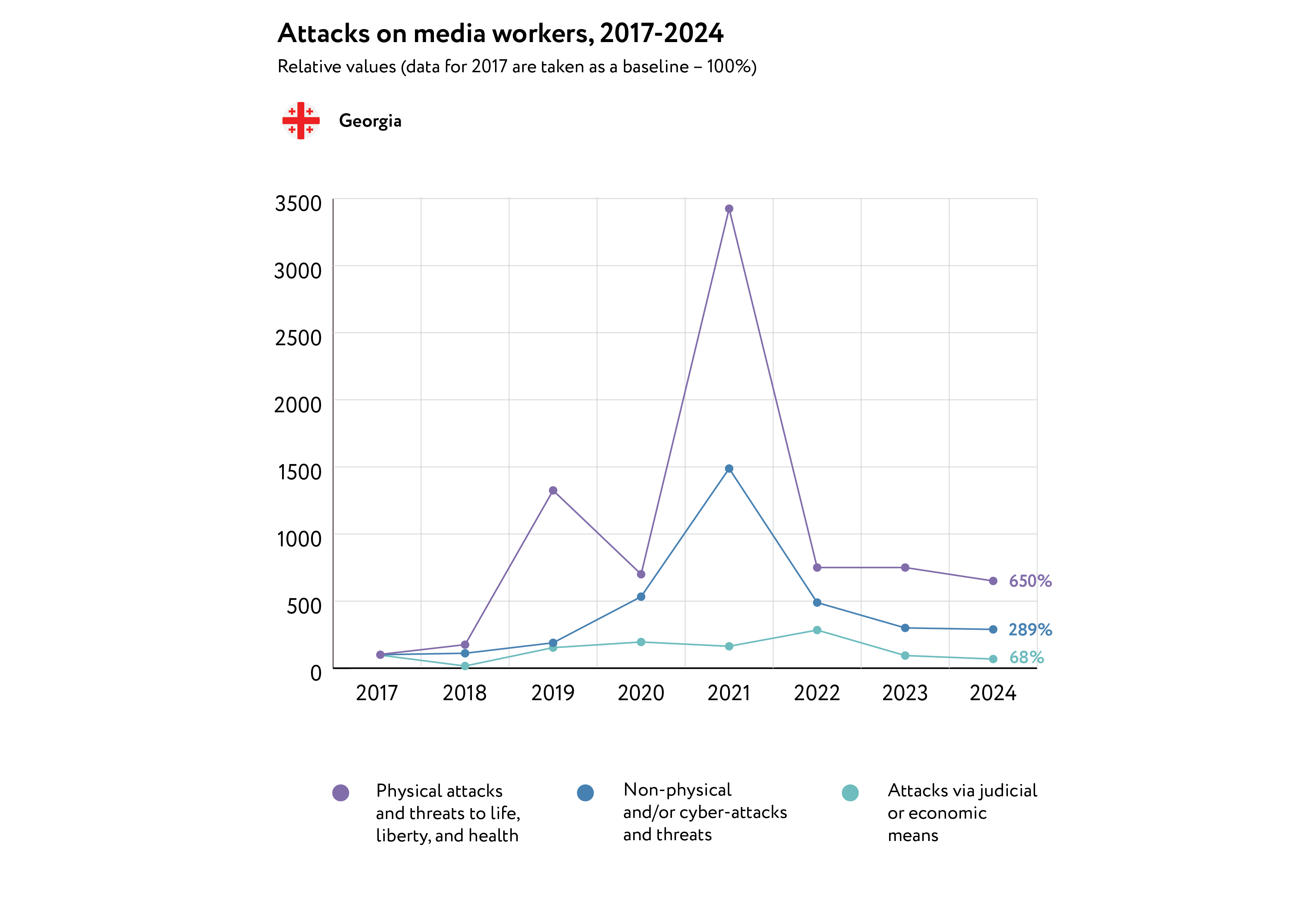
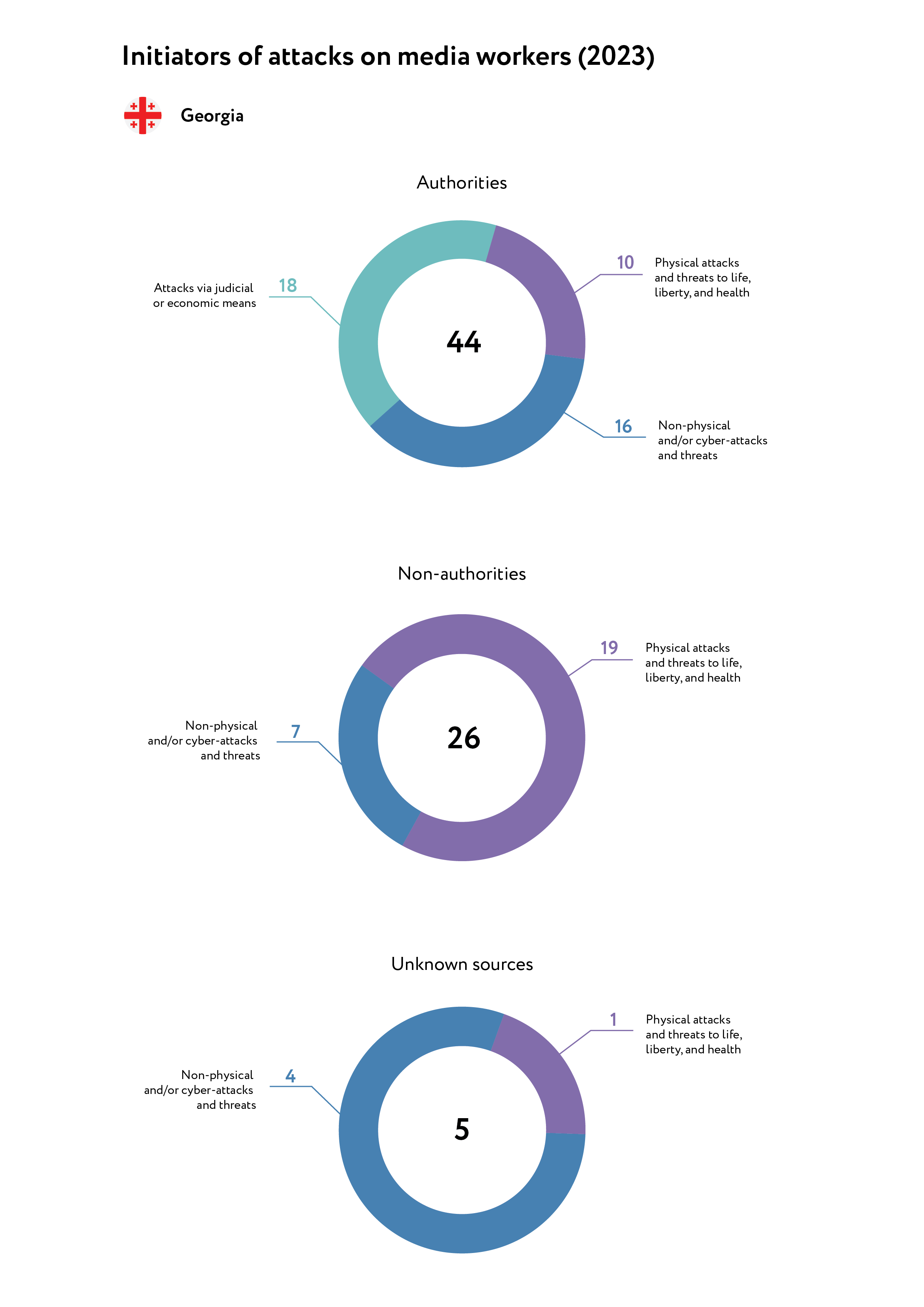
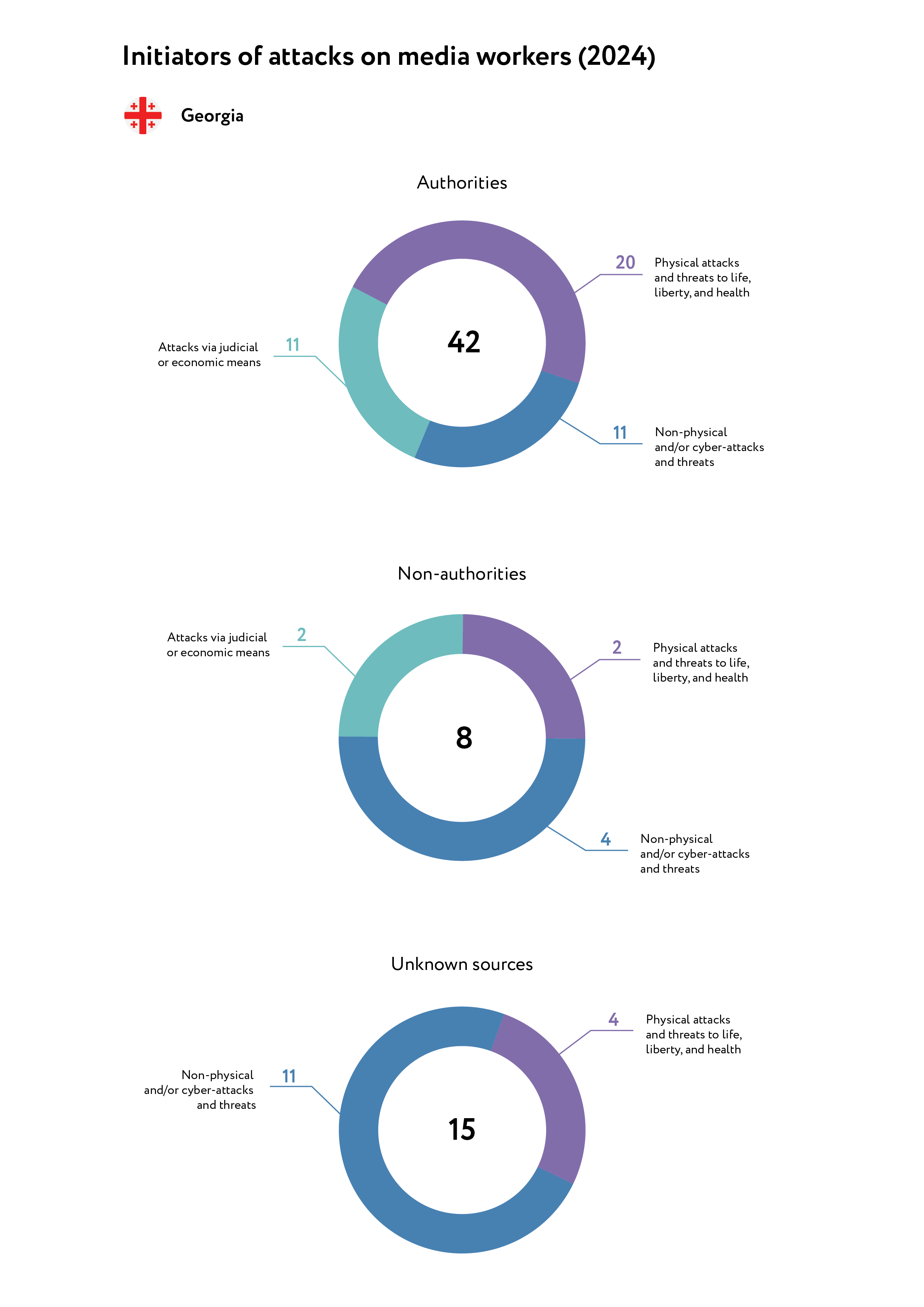
As in previous years, journalists from opposition TV channels such as Mtavari Arkhi, Formula, and Pirveli were the primary targets. However, following the reintroduction of the foreign agent law, the government also focused on independent online media outlets, most of which are donor-funded and therefore prime targets of the foreign agent law. Other legislative attacks included accreditation restrictions and bans on individual journalists or entire online media outlets during parliamentary hearings on the foreign agent law.
In 2024, many journalists became targets of hate campaigns labelling them as “agents.” These coordinated campaigns were conducted both online, by pro-government media and affiliated pages, and offline, with posters and banners in the streets, vandalised apartments, offices, and anonymous threatening phone calls. Gela Mtivlishvili, head of the online outlet Mtis Ambebi, and Nino Zuriashvili, head of the investigative team Monitori, were repeatedly targeted by these campaigns, including vandalism of their offices and Zuriashvili’s car.
4/ PHYSICAL ATTACKS AND THREATS TO LIFE, LIBERTY AND HEALTH
There were 56 cases of physical attacks and threats to life, liberty, and health recorded in 2023-2024, with 26 occurring between January and July 2024, and 30 in 2023. All recorded incidents were non-fatal. Only one incident fell under the sub-category of abduction, or illegal deprivation of liberty:
- On 26 January 2023, Tamta Dolendzhashvili, an investigative journalist with Pirveli TV, was taken hostage while filming a report on an illegal company dealing in Russian rubles. She was attacked and locked in a room by company employees, who demanded she erase her footage to be released. She was freed by a patrol police unit.
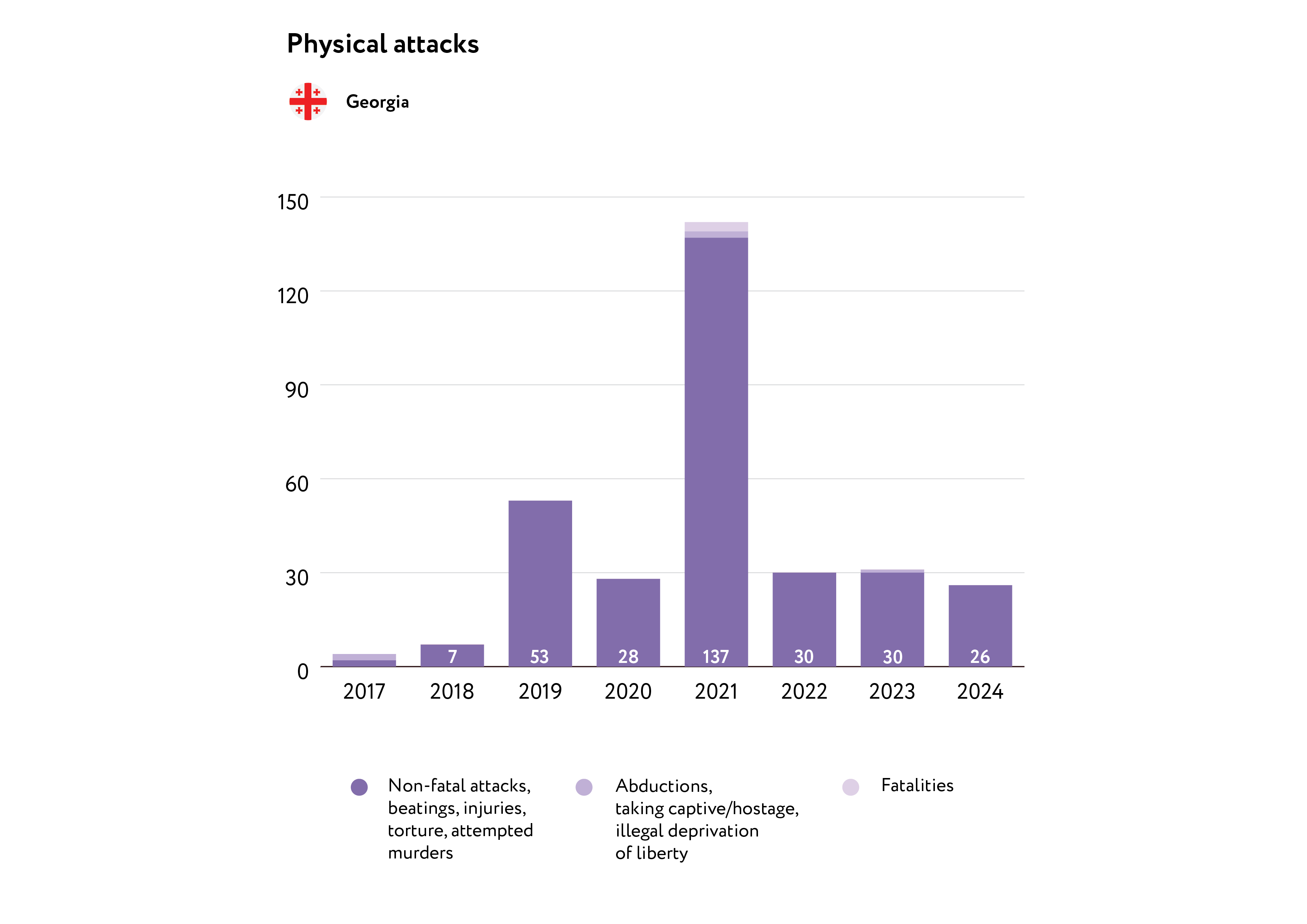
Cases of physical violence against journalists can be divided into two categories:
1) Attacks by Individuals Not Directly Connected to the Authorities: These include attacks by guards of private establishments or individuals ideologically aligned with the authorities:
- On 25 June 2024, unknown individuals attacked Mtavari TV journalist Lado Menadze and cameraman Manuchar Mzhavanadze in Supsa. The crew was working on a report about a high-ranking police officer’s ties with billionaire businessman Bidzina Ivanishvili. The attackers insulted and then physically assaulted the journalists.
- On 15 March 2023, Nato Gogelia, a journalist with Pirveli TV, was attacked in the village of Bakhvi, Ozurgeti district. She was interviewing Mamuka Andghuladze, who had taken down and attempted to burn an EU flag during a conservative rally. Andghuladze attacked Gogelia and damaged her equipment.
- On 5 July 2023, an unknown person attacked Mtavari TV journalist Tea Vashalomidze while she was on duty, damaging her microphone and interfering with her professional activities.
2) Targeted Attacks by Police or Government Officials: These often occurred while journalists were covering protests against the foreign agents bill in both 2023 and 2024, sometimes involving the use of special equipment.
- On 30 April 2024, a riot police officer used pepper spray on Basti Mgaloblishvili, a journalist at Publika, and Lika Zakashvili, editor of Publica, during the dispersal of the protest against the foreign agents bill in Tbilisi, outside the parliament. The police deliberately pointed the spray at their faces. Other journalists injured include Pirveli journalist Nanuka Kajaia and cameraman Niko Kokaia.
- On 16-17 April 2024, there was a protest against the foreign agents bill outside the parliament. At around 12:30, riot police used force on people without prior warning. When the dispersal started, OC Media journalist Mariam Nikuradze was documenting riot police officers beating protesters. The police prevented her from doing so, pushed her, and demanded she leave the area. Several journalists were injured during the protest: Tabula journalist Giorgi Badridze, Publica journalist Aleksandre Keshelashvili, and Aprili Media journalist Giorgi Baskhajauri.
- On 1 May 2024, Robi Zaridze, a journalist with the investigative team iFact, was beaten by several police officers during the mass dispersal of the protest against the foreign agents bill and then taken to a detention van with other protesters. He was released from the van, but police took his phone and returned it damaged. The journalist sustained multiple injuries. Police officers also grabbed Dea Mamiseishvili, a journalist from Mtavari TV, by the throat and tried to push her back during the mass dispersal of the protest. Among other injured media workers were freelance photographer Giorgi Nakashidze; Zuka Chkhivrkia, camera operator for Mtavari TV; Avto Meskhi, camera operator for Mtavari TV; and Cnews journalist Giga Gelkhviidze.
- On 14 May 2024, police officers physically attacked photojournalist Giorgi Zhamerashvili on Rustaveli Avenue while he was covering the protest against the foreign agents bill, shortly after the bill passed the third hearing. Police wouldn’t let him pass to get closer to the parliament, and one of them hit him with a baton.
- On 8 March 2023, Georgian media representatives sustained injuries during the dispersal of a rally on Rustaveli Avenue. Riot police used tear gas to disperse the protest, affecting dozens of journalists and camerapersons. In one incident, a gas grenade exploded at the feet of a journalist. At least ten media workers were impacted by the gas: Formula TV journalist Tea Tetradze, Publica journalist Aleksandre Keshelashvili, Netgazeti journalist Mikheil Gvadzabia, Publica journalist Basti Mgaloblishvili, Formula TV’s Nika Kokaia, Formula TV journalist Giorgi Kvizhinadze, Formula TV journalist Davit Mania, Formula TV journalist Nika Sajaia, and Mediachecker.ge editor-in-chief Giorgi Gogua.
5/ NON-PHYSICAL AND/OR CYBER-ATTACKS AND THREATS
52 incidents were recorded under the category of non-physical and/or cyber-attacks and threats. Damage to/seizure of property, equipment, documents, and denial of access to information remained the main methods of pressure, as in previous years. Thirteen of these cases were recorded in Tbilisi, two in Khaishi village, and three in Ozurgeti.
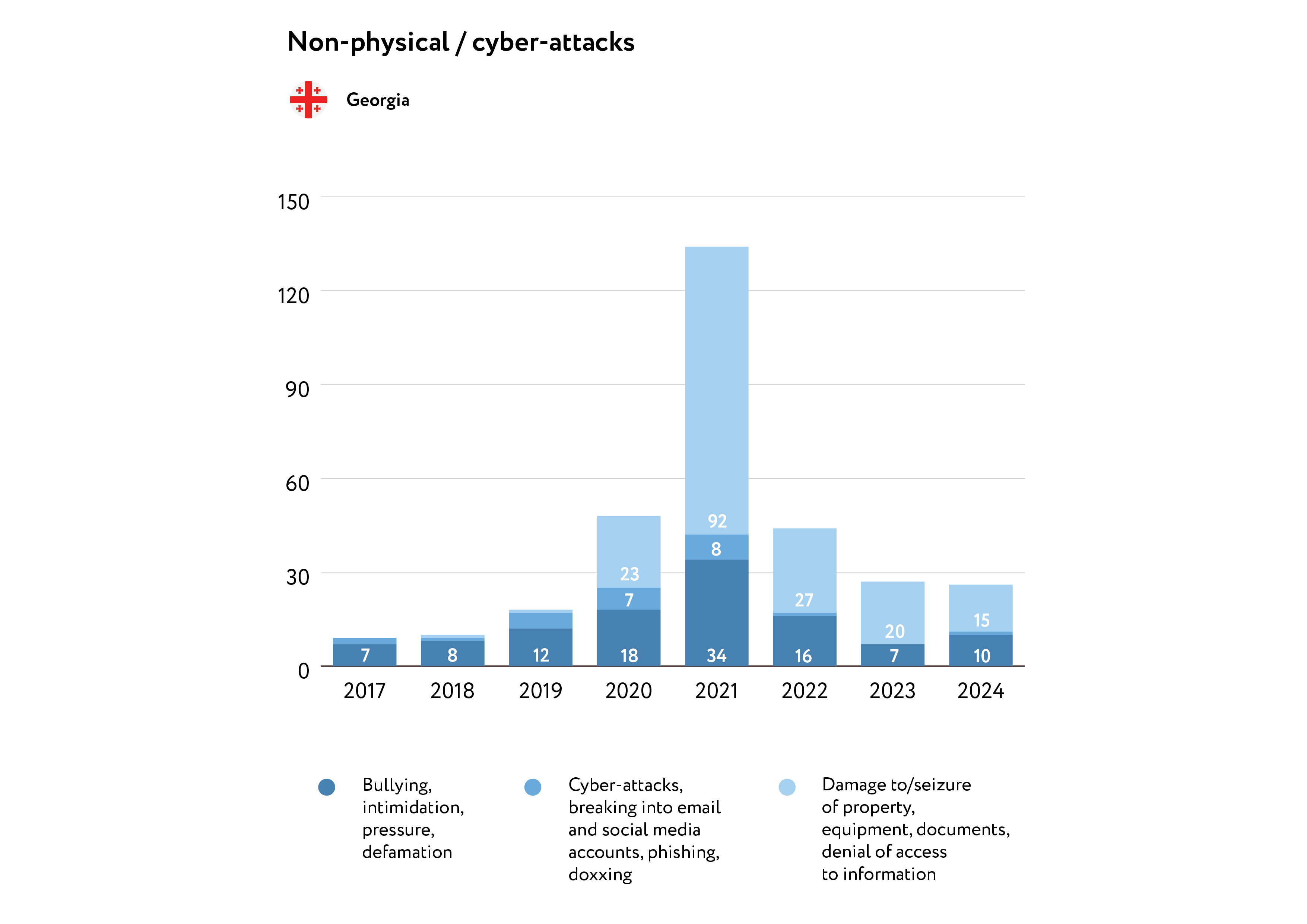
- On 21 April 2024, Eka Sepashvili, a member of the parliamentary majority, insulted a Formula TV camera crew and threatened to halt their parliamentary accreditation if they broadcast an interview with her.
- On 9 May 2024, Nino Zuriashvili, head of the investigative documentary outlet Studio Monitor, and Gela Mtivlishvili, editor-in-chief of the independent website Mountain News, told CPJ that unknown individuals covered the entrances to their offices with posters and graffiti denouncing them as “foreign agents.” A day later, an unknown individual damaged Nino Zuriashvili’s car. Additionally, insulting and hateful posters were affixed to the wall of her house. Similar posters with offensive content were also displayed in the building housing Studio Monitor’s office.
- On 8 May 2024, unknown people called Natia Kuprashvili and threatened her with assault. They identified the address where the journalist was living and said they were waiting for her at her apartment.
- On 13 June 2023, journalist Vasil Dabrundashvili reported a break-in at his house and said that important documents had disappeared. The stolen documents included the decision of the Tbilisi Prosecutor’s Office to recognise him as a victim of illegal wiretapping and secret surveillance in 2022.
Among other recorded incidents:
- On 15 June 2024, media outlet Mtis Ambebi and its founder Gela Mtivlishvili became targets of a cyber-attack on Facebook: “… our investigative films and critical whistleblower materials covering the Shovi tragedy, Chiatura ecological disaster, occupation of Racha forests, Balda Canyon, corruption within the Protected Areas Agency, and other vital topics were unexpectedly deleted from our Facebook page.”
5/ ATTACKS VIA JUDICIAL AND/OR ECONOMIC MEANS
31 cases of attacks via judicial and/or economic means were recorded from 1 January 2023 to 31 July 2024. There were six cases of court trials, five cases of criminal/administrative prosecution, and two cases of confiscation/seizure of property, vehicles, equipment, and documents.
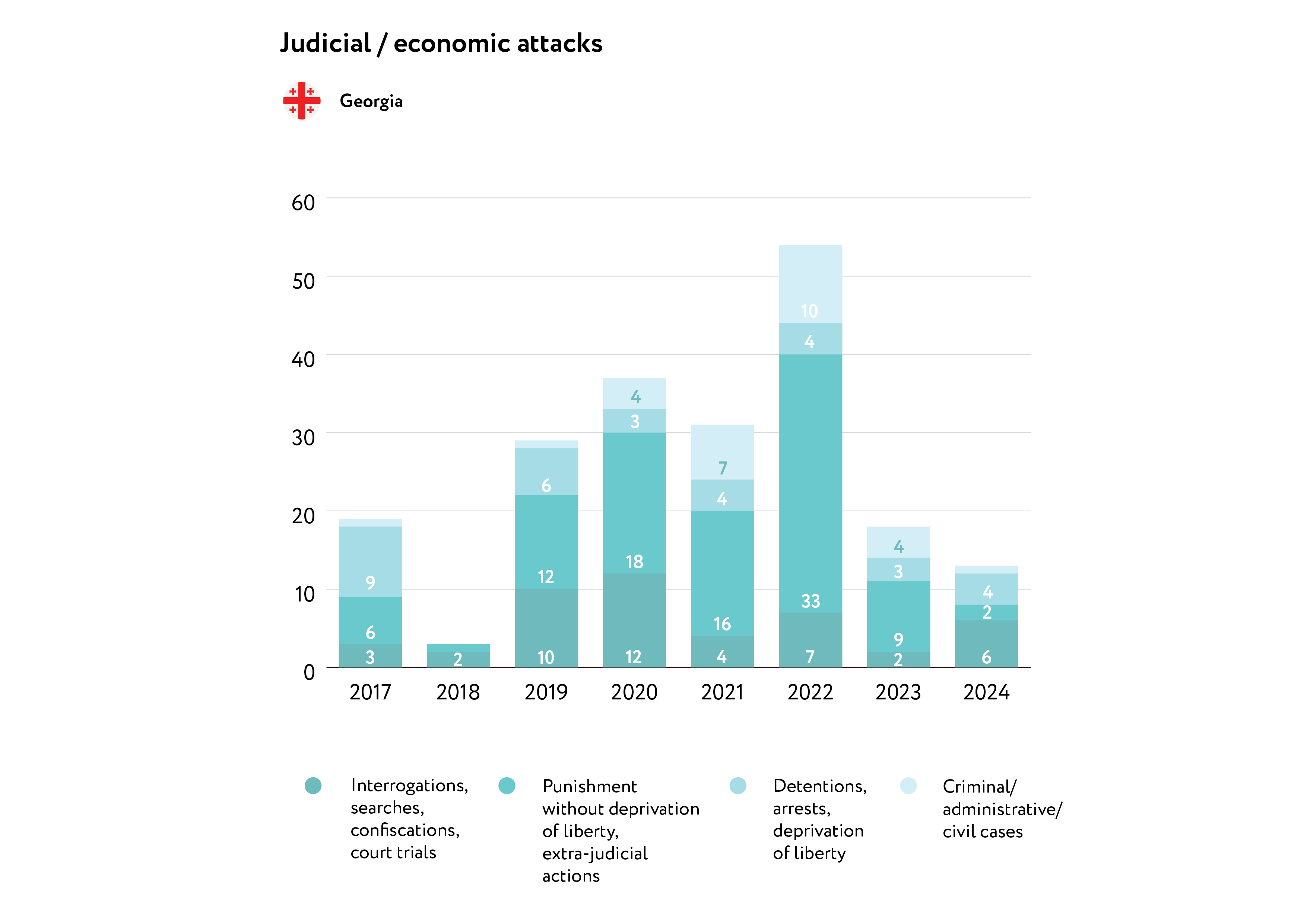
- On 31 January 2024, the Tbilisi City Court imposed a GEL 2,000 (approximately 750 USD) fine on Gela Mtivlishvili, founder and editor-in-chief of the Georgian news agency Mtis Ambebi [Mountain Stories]. Mtivlishvili had been detained by police during the Kekelidze Street eviction standoff on 23 January 2024 and was released on parole later that day. He was charged with disobedience to the police.
- On 24 June 2024, influential businessman Giorgi Kapanadze (Rizha), who has strong ties with the ruling party, filed a defamation lawsuit against eight journalists from four media outlets, including Radio Liberty investigative journalist Giorgi Mgeladze. The lawsuit was directed at Formula TV, Main Channel, TV First, and Radio Liberty. Kapanadze’s lawsuit referred to material from 2020, and therefore, the statute of limitations had passed. The preparatory session was held on 27 June 2024 and was postponed without specifying a new date. The plaintiff, Giorgi Kapanadze, did not attend the session.
- On 18 April 2023, the Tbilisi City Court fined Zurab Vardiashvili, the director of Publika, GEL 2,200 (approximately 876 USD). Vardiashvili was found guilty of petty hooliganism and disobedience to the police. He had been detained on 2 March during a rally against the adoption of the Law on Agents of Foreign Influence and was released a few hours later.
- On 19 April 2023, the Tbilisi City Court fined Beka Dzhikurashvili, a journalist with Tabula, GEL 2,200 (approximately 876 USD). He was found guilty of petty hooliganism and disobedience to the police under two articles of the Code of Administrative Offences of Georgia. Dzhikurashvili, along with Zurab Vardiashvili, the editor and director of Publika, had been detained on 2 March while performing their professional duties at a rally against the Russian-style law on foreign agents.
In 2024 during the protests against foreign agents’ law at least two incidents related to the confiscation/seizure of equipment were recorded:
- On 17 April 2024, during a protest against the foreign agents’ draft law outside the parliament, Tabula journalist Giorgi Badridze was beaten, and his phone was taken by the police. Afterwards, he used his work phone, but the police attempted to seize that phone as well.
- On 14 May 2024, while covering a protest against the foreign agents bill outside the parliament, Indigo journalist Saba Sordia reported that a police officer unexpectedly seized his camera as he was filming the situation at the front entrance where riot police were preparing for dispersal.
Six foreign journalists were denied entry to Georgia:
- On 26 March 2024, Tajik journalist Anushervon Aripov, along with several other Tajik citizens, was denied entry into Georgia and was forced to return to Vladikavkaz, Russia. The reasons for the entry refusal were not provided.
- On 12 January 2023, at the Sarpi border between Georgia and Turkey, Azerbaijani freelance journalist Seymour Hazy was denied entry without any explanation.
- On 5 February 2023, a former SMM editor for Team 29 Elena Skvortsova was once again denied entry to Georgia for “other reasons”. In Georgia, the exiled Russian journalist intended to meet with her family and showed the border guards her Czech residence permit. Skvortsova was previously denied entry to the country on 19 December 2022.
- On 19 February 2023, border guards at the Tbilisi airport told Russian writer and journalist Filipp Dzyadko that he could not enter the country because their computer was frozen, saying they “could not comment on anything”, according to news reports and the journalist’s testimony. He told CPJ that he believed this refusal was linked to his former journalistic work for Dozhd TV, the now-defunct newspaper “Bolshoy Gorod”, and an “anti-war” novel he published in April 2022. He said it was also possibly related to his brother Tikhon’s work for Dozhd TV. The journalist stayed in the airport until the following day, when he took a flight to Armenia. He had been living in Georgia since March 2022.
- On 14 March 2023, Aleksandra Shvedchenko, a Russian journalist with the exiled Russian broadcaster Dozhd TV (TV Rain), was denied entry to Georgia. She was put back on a plane to Riga, Latvia. The journalist had been living in Tbilisi for a year.
- On 18 April 2023, Russian publicist Aleksandr Arkhangelsky was denied entry to Georgia. He said he was “thoroughly questioned about Abkhazia”. He was deported on the same plane he arrived on. The reason for this decision was not explained to him.
Among other incidents reported in 2023-2024:
- On 3 August 2024, Azerbaijani journalist Afgan Sadygov was arrested in Tbilisi, two weeks after Georgian border guards had barred him from leaving the country unless he travelled to Azerbaijan. The Georgian Interior Ministry stated that Azerbaijan had requested his extradition. His wife, Sevinj, also a journalist, described the arrest as politically motivated and expressed concerns that if he is extradited to Azerbaijan, he will face imprisonment.
ANNEX 1: OPEN SOURCES USED FOR GATHERING DATA (GEORGIA)
- Caucasian Knot – a news and analysis website about events in the Caucasus, in the Russian language;
- CASE – a coalition of non-governmental organisations from across Europe united in recognition of the threat posed to public watchdogs by Strategic Lawsuits Against Public Participation (SLAPPs);
- Civil.ge – a project by the UN Association of Georgia, delivering news and analysis since 2001;
- European Centre for Press and Media Freedom(ECPMF) – a non-profit organisation that promotes, protects and defends the right to a free media and freedom of expression throughout Europe;
- Freedom House – an international human rights NGO that evaluates and publishes reports on the level of freedom in 210 countries and territories worldwide, including on freedom of speech and media activity;
- First Channel – the news website of the Public Broadcasting of Georgia television channel, in the Georgian and Russian languages;
- Formula TV – a news television channel, in the Georgian language;
- Georgian Charter of Journalistic Ethics – an independent union of journalists aimed at raising the social responsibility of media through protection of professional and ethical standards, and development of self-regulation mechanisms;
- International Republican Institute (IRI) – an American nonprofit organisation. Its public mission is to advance freedom and democracy worldwide by helping political parties to become more issue-based and responsive, assisting citizens to participate in government planning, and working to increase the role of marginalized groups in the political process, including women and youth;
- IPN (InterPressNews) – a news website about events in Georgia, in the Georgian, English, and Russian languages;
- Mtavari Arkhi – a television channel, in the Georgian language;
- Netgazeti.ge – a news and analysis website about events in Georgia, in the Georgian language;
- Newsreport.ge – a news website about events in Georgia, in the Georgian language;
- News Georgia – a news website about events in Georgia, in the Russian language;
- OC-Media – an independent online news platform covering news from the North and South Caucasus regions;
- On.ge – a news website about events in Georgia and the Caucasus, in the Georgian language;
- Radio Tavisupleba – the website of Radio Liberty’s Georgian service, in the Georgian language;
- Reporters Without Borders — an international non-profit and non-governmental organisation with the stated aim of safeguarding the right to freedom of information;
- Tabula – a news and analysis website about the politics and economy of Georgia, in the Georgian language.
